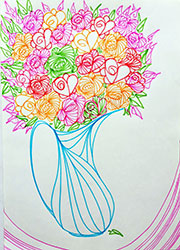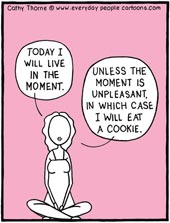The Realm of Hungry Ghosts video by Tara Brach [20 min]
The Terribly, Tragically Sad Man story by Loren Seibold
In The Realm of Hungry Ghosts, Tara makes the point that desire is natural, a part of existing in a dynamic and alive universe, but it is being "hooked", or being attached, that causes suffering. Also introduced at this graduate meeting was the story, The Terribly, Tragically, Sad Man, a poignant parable about a man who learns how to love what he already has. Just for fun, check out "You are Probably..." in the Closing Thoughts section.
Our human trouble arises from desire. Not all desires generate problems, however. There are two kinds of desires: demands ("I have to have it") and preferences. Preferences are harmless; we can have as many as we want. Desire that demands to be satisfied is the problem. It's as if we feel constantly thirsty, and to quench our thirst, we try to attach a hose to a faucet in the wall of life. We keep thinking that from this or that faucet, we will get the water we demand...
What are some of the faucets we try to attach ourselves to, in order to quench our thirst? One might be a job we feel that we must have. Another might be "the right partner," or "a child who behaves as he or she should." Fixing a personal relationship may seem to be the way to get that drink. Many of us also believe that we will finally quench our thirst if we can only fix ourselves. It makes no sense for the self to fix the self, but we persist in trying to do it. What we regard as ourselves is never quite acceptable to us. "I don't get enough done." "I'm not sufficiently successful." "I'm always angry, so I'm worthless." "I'm a poor student." We demand countless things of ourselves and the world; almost anything can be seen as desirable, a faucet we can attach ourselves to, so that we can finally get the drink we believe we need. Bookstores are full of self-help books, proclaiming various remedies for our thirst: How to Make Your Husband Love You, or How to Build Self-Esteem, and so on...
The problem is that nothing actually works. We begin to discover that the promise we hold out to ourselves—that somehow, somewhere, our thirst will be quenched—is never kept. I don't mean that we never enjoy life. Much in life can be greatly enjoyed: certain relationships, certain work, certain activities. But what we want is something absolute. We want to quench our thirst permanently, so that we have all the water we want, all the time. That promise of complete satisfaction is never kept. It can't be kept. The minute we get something we have desired, we are momentarily satisfied—and then our dissatisfaction rises again.
- from Nothing Special by Charlotte Joko Beck
We are constantly grasping at things we want. Sometimes it is just a little greediness – we want more food, or more credit, or more love. And sometimes it's a large hunger that cannot be satisfied, no matter how hard we try. But little or big, if we don't get the object of our immediate desire, we can feel incomplete, out of sorts, perhaps totally miserable.
Of course, we sincerely believe that if we just get that one thing we are lacking, whatever it is, then we will feel complete again. And that is true, as far as it goes. It does feel good . . . until we feel incomplete again, and then we grasp a little bit more . . . until we get the next thing. And that sets off a never-ending cascade of dissatisfactions. It is clinging writ large, the tendency that the Buddha declared to be the root cause of suffering. When greed is operating, there always seems to be something missing – something that if only we had it, we would be complete.
- from Mindfulness for Beginners by Jon Kabat-Zinn
We are addicted to pleasure, in part because we confuse pleasure with happiness. We would all say that deep down, all we want is to be happy. Yet we don't have a realistic understanding of what happiness really is. Happiness is closer to the experience of acceptance and contentment than it is to pleasure. True happiness exists as the spacious and compassionate heart's willingness to feel whatever is present.
- from Against the Stream by Noah Levine
Awareness meditation is a way of opening our attention to the truth of what is present. We do not selectively pay attention to pleasant things and ignore the unpleasant. We open choicelessly, to what is positive and joyous as much as to the suffering that we find. Meeting each moment without resistance, we discover unsuspected beauty in our hearts, minds, and bodies, and in the world around us. We sense the uniqueness of each fleeting breath. We perceive the movement of nature within us. We feel sad without needing to justify or eliminate the emotion. We feel happy without needing to believe that we will never again know sadness. This is the way of meditation.
- from In the Lap of the Buddha by Gavin Harrison
[ contributed by Palouse Mindfulness graduates ]
God, grant me the serenity to accept the things I cannot change, courage to change the things I can, and wisdom to know the difference.
- Reinhold Niebuhr
from Dave:
God, grant me the serenity to accept the people I cannot change, courage to change the one person I can, and wisdom to know that person is me.
- La Sarmiento
from Laura (Idaho):
Live in the moment
Trust in the process
Detach from the outcome
- unknown
from Jan (South Dakota):
The richest man is not he who has the most, but he needs the least.
- unknown
I’ve seen better days, but I’ve also seen worse. I don’t have everything that I want, but I do have all I need. I woke up with some aches and pains, but I woke up. My life may not be perfect, but I am blessed
- unknown
from, and by, Nikki (New Jersey):
The thing about demanding is that it is an ineffective form of violence - to ourselves and the ones we are demanding. Whether we are a tired-of-repeating-ourselves mom, an extreme, persuasive world leader (Hitler), or a long-time sufferer from a chronic illness, our demands never, ever get us our way, not in the long run. It seems to only destroy the demander as well as the ones we are demanding with subversive behaviors, fears and pain. Preferring, which comes from a place love, creates freedom, love and space for real healing to occur and from there situations and emotions resolve themselves.
from Christina (Hong Kong) - art by Christina:

Life is at its best when it is fresh, new and spontaneous.
- Deepak Chopra
from, and by, Claudia (Portugal):
As for the quote about this month´s theme: many times I find myself confronted with my children´s (loved ones, etc...) actions which don´t correspond to my demands/expectations. In these times, besides trying to take things just as they are and not wanting them to be different, I always remind myself of this swedish proverb:
Love me when I least deserve it, because that is when I need it the most.
from, and by, Karen (Montreal):
Certainly difficulties do arise from time to time but “Bear the discomfort and comfort will come” always comes to mind as those words reflect the need to be with and let it pass as will naturally occur.
from Chuck (West Virginia):
You are probably...
by Jack Kornfield (as presented by Shauna Shapiro)
If you can sit quietly after difficult news...
If in financial downturns you remain perfectly calm...
If you see your neighbors travel to favorite places without a tinge of jealousy...
If you can happily eat whatever is put on your plate...
If you can love everyone around you unconditionally...
If you can always find contentment just where you are...
You are probably... [click here]
...to be present with any situation, and to hold it with tenderness and compassion.
- Cheen (Singapore)
...to accept, but not be passive...
- Celeste (Portugal)



